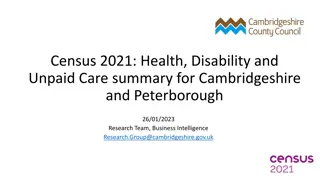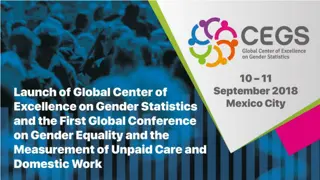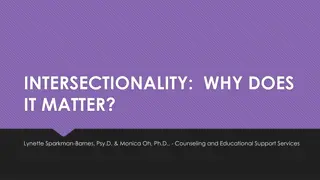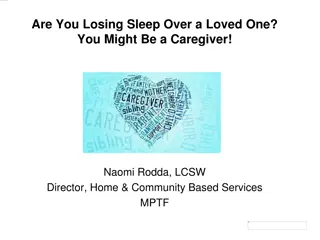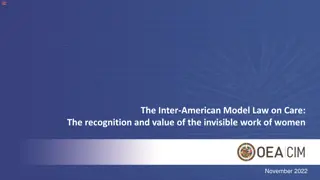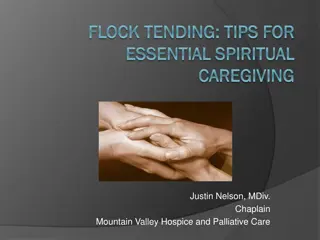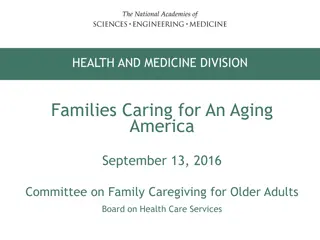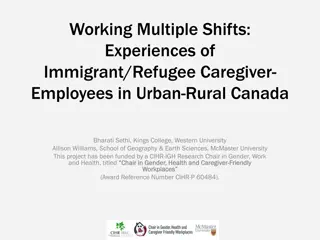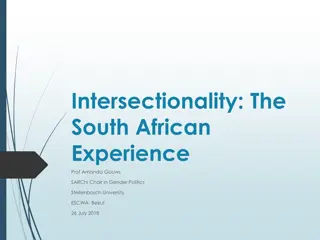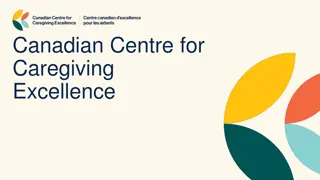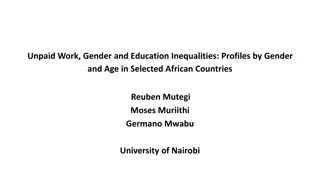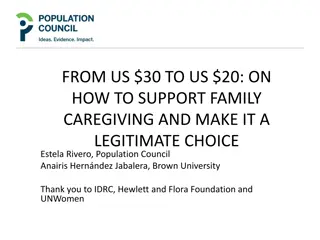Understanding Intersectionality and Unpaid Caregiving: Key Insights
Intersectionality, a concept by Kimberle Crenshaw, highlights how social factors beyond gender influence caregiving. In the UK, 10.6 million unpaid caregivers, mostly women, provide essential care. The financial burden of caregiving is significant, with many facing financial hardships and relying on minimal benefits like Carer's Allowance. Recognizing and supporting unpaid caregivers is crucial for societal well-being.
Download Presentation

Please find below an Image/Link to download the presentation.
The content on the website is provided AS IS for your information and personal use only. It may not be sold, licensed, or shared on other websites without obtaining consent from the author. Download presentation by click this link. If you encounter any issues during the download, it is possible that the publisher has removed the file from their server.
E N D
Presentation Transcript
Intersectionality and Caregiving Intersectionality and Caregiving By Mariama Korrca Kandeh
What is intersectionality What is intersectionality A feminist theory coined by American feminist, academic, civil rights advocate, and lawyer Kimberle Crenshaw It shows how a woman s experience is not just defined by gender but her race, ethnicity, ability, sexuality and more. Crenshaw argues that feminism neglects race, and by doing so discriminates against women of colour. Intersectionality gives insight on how social factors like our gender, race, ethnicity etc. influence our caregiving experience
A person who provides a social or physical support and/or help to a person who is differently abled, sick or aging. They can be paid or unpaid. A relative, your child, a family, or a neighbour. We also have professional caregivers. Who is a Who is a caregiver? caregiver? Focus - Unpaid Caregivers
Key facts about Unpaid care in the UK Key facts about Unpaid care in the UK According to the Census in 2011, 6.5 million people in the UK are providing unpaid care (Census 2011). Carers UK estimates that the number of unpaid carers has risen to 10.6 million (Carers UK, Carers Week 2022 research report). This means that 1 in 5 adults in the UK are currently providing care. Every year, 4.3 million people became unpaid carers 12,000 people a day (Petrillo and Bennett, 2022). 58% of unpaid carers are women (Census 2011). Women are more likely to become carers and to provide more hours of unpaid care than men. More women than men provide high intensity care at ages when they would expect to be in paid work (Petrillo and Bennett, 2022) One in seven carers in the UK are juggling work and care (Carers UK, Juggling Work and Care, 2019). Between 2010-2020, people aged 46-65 were the largest age group to become unpaid carers. 41% of people who became unpaid carers were in this age group (Petrillo and Bennett, 2022).
Value of Unpaid Care The value of unpaid care was estimated at 530 million per day and 193 billion per year during the pandemic (Carers UK, Unseen and Undervalued, 2020).
Financial impacts of caring With the current cost of living crisis, carers are facing unprecedented pressure on their finances: a quarter of carers (25%) are cutting back on essentials like food or heating and 63% are extremely worried about managing their monthly costs (Carers UK, State of Caring 2022). Caring comes with additional costs that can have a significant impact on carers finances and many carers suffer financial hardship. 44% of working- age adults who are caring for 35 hours or more a week are in poverty. (Joseph Rowntree Foundation, UK Poverty 2022). Carer's Allowance is the main carer's benefit and is 69.70 for a minimum of 35 hours. It is the lowest benefit of its kind. In the UK, 977,506 carers were in receipt of Carer s Allowance in 2022 (X-Stat Explore (retrieved in Feb 2022).
Health impact of caring Health impact of caring Caring can have a serious effect on health and wellbeing. 60% of carers report a long- term health condition or disability compared to 50% non-carers (Carers UK analysis of GP Patient Survey 2021). Over a quarter of carers (29%) feel lonely often or always (Carers UK, State of Caring 2022). There is increasing evidence that caring should be considered a social determinant of health (Public Health England, Caring as a Social Determinant of Health, 2021).
On average, 600 people a day leave work to care with over 500,000 people leaving work to provide unpaid care pre-pandemic (Carers UK, Juggling Work and Care). 75% of carers in employment worry about continuing to juggle work and care (Carers UK, State of Caring 2022). From Job to From Job to unpaid unpaid caregiving caregiving 1 in 3 NHS staff provide unpaid care (NHS staff survey, 2021). Between 2010 and 2020, more than 1.9 million people in paid employment became unpaid carers every year (Petrillo and Bennett, 2022)
Black, Asian and ethnic minority carers are more likely to be struggling financially. At the beginning of the pandemic, over half (58%) of unpaid carers from BAME groups said they were worried about their finances, compared to 37% of White carers (Carers UK, The Experiences of Black, Asian and minority ethnic carers during the COVID-19 pandemic, 2022). Caregiving, Race Caregiving, Race and Ethnicity and Ethnicity In a 2022 State of Caring survey by Carers UK 27% of carers said they had a disability.
BAME carers struggle to access relevant services for themselves and the people they care for Language barrier Caregiving, Race Caregiving, Race and Ethnicity and Ethnicity Cultural misunderstanding and judgmental/negative attitudes from professionals Communication barrier between authorities and carers
The role of caring for a family or informal caregiving can be stressful, life- consuming transaction that often impacts our social, emotional, mental and financial wellbeing. Caregiver burden has been described as a negative reaction to the impact of providing care on caregivers social, occupational, and personal roles, one that is not given much thought compared to other roles in society. E.g professional carers. Studies suggest that stress, anxiety, depression and other mental health issues and medical conditions, overall poor health and a lowered immune system, burnout including higher blood pressure can quickly be compounded with the burden of a carer. Challenges of Challenges of Caregiving Caregiving Most alarming, family caregivers experience an increased mortality rate and in turn will unfortunately put the care recipient at greater risk for abusing.
Support for Caregivers Support for Caregivers Various programs and interventions have been developed to assist family caregivers to cope with the demands of caregiving. These include: Assistance with caregiving or related tasks Emotional or educationalsupport Information and referral, Education Support groups Counseling, Foodbank Personal care services such as home health or adult day centers Mental health and wellbeing support Volunteering opportunities
Conclusion Conclusion Unpaid Caring is profound





